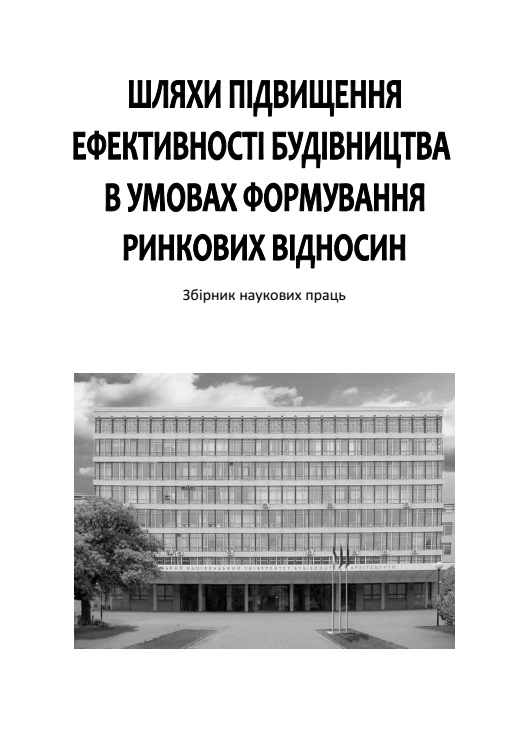Provision of economic-responsible and analytical-controlling function of asset management instruments
DOI:
https://doi.org/10.32347/2707-501x.2018.38.36-44Keywords:
investment and construction project, investments, project management, stakeholder approach, risk management, resource support.Abstract
The article is devoted to the development of scientific and methodological basis and tools for investment support of housing construction, which is considered in the context of mutual coordination with the specifics of economic and contractual relations of leading subjects of residential development – lender, developer, investors. Methodological developments are based on the existing methodology of project management, the formation of a simplified and complete conceptual model of differentiated attraction of sources of resource support, based on the theory of stakeholders, methods of economic evaluation of sources of financing and attraction of investments and value-oriented goal-setting. The paper analyzes the existing concepts, models, methods of management of investment and construction projects, characterizes the current level of success of such projects. It was found that the housing project management system needs to be improved in terms of shifting the emphasis from maximizing the profit of builders to achieving the value of the project results for all its stakeholders throughout the life cycle of the project. The conceptual model of the problem-targeted differentiated choice of sources of resource support for investment and construction projects in housing construction is proposed.
References
Економетричний інструментарій управління фінансовою безпекою підприємств будівництва [текст]: [монографія] / [Л.В. Сорокіна та ін.]; за наук. Ред. проф. Сорокіної Л.В., Гойка А.Ф. - Київ : КНУБА, 2017. – 403 с.
Теоретико-метологічні засади інноваційно-інвестиційної діяльності в Україні./ П.М. Куліков, В.Г. Федоренко, Г.М. Рижакова та ін., кол. монографія. ТОВ «ДКС центр». Київ, 2018. 442 с.
Мarchuk Т. Identification of the basic elements of the innovation analytical platform for energy efficiency in project financing. / Т. Мarchuk, D. Ryzhakov, G. Ryzhakova, S. Stetsenko // Investment management and financial innovations (open-access), 2017 14(4), pp. 12-20. Doi:http://10.21511/imfi.14(4).2017.02
Поколенко В.О. Запровадження інструментарію вибору альтернатив реалізації будівельних проектів за функціонально-технічною надійністю організацій-виконавців / В.О. Поколенко, Г.М. Рижакова, Д.О. Приходько // Управління розвитком складних систем. – 2014. – Вип. 19. – С. 104-108
Рижакова Г.М. Моделі цільового вибору репрезентативних індикаторів діяльності будівельних підприємств: етимологія та типологія систем діагностики / ГМ. Рижакова, Д.О. Приходько, К.М. Предун // Управління розвитком складних систем. – 2017. – Вип. 32. – С. 159-165.
Інноваційний розвиток підприємства: навч. посіб. / В.Г. Федоренко, Т.Є. Воронкова, Г.М. Рижакова; КНУБА, екон. шк. Акад. УАН В.Г. Федоренко, укр. Акад. Наук. - Київ : Дкс центр, 2014. – 352 c.
Chernyshev D. Formation of the methodical-analytical system of indicators of providing biosphere-compatibility at the preparation and organization of construction / D. Chernyshev // Управління розвитком складних систем, 2018. № 34 – С. 191-198.
Chernyshev D. Implementation of principles of biospheric compatibility in the practice of ecological construction in ukraine [Текст] / D. Chernyshev, I. Ivakhnenko, G. Ryzhakova, K. Predun // International journal of engineering & technology – uае: science publishing corporation, 2018, vol 10, no 3.2: special issue 2 – рр. 584-586.
Ізмайлова К.В. Вплив фінансового важелю у впровадженні схем проектного фінансування в Україні / К.В. Ізмайлова // Шляхи підвищення ефективності будівництва: зб. наук. праць. – Вип.28. – 2012. – С. 82-87
Вахович І.В. Економічна ефективність використання вторинних ресурсів в будівництві / І.В. Вахович, Л.В. Терещенко, Т.Ю. Цифра, Ю.О. Редькін // Шляхи підвищення ефективності будівництва в умовах формування ринкових відносин: зб. наук. праць. – Київ:, 2012. – Вип.28, ч.2. – С. 125-131.
Downloads
How to Cite
Issue
Section
License
Copyright (c) 2020 G. Ryzhakova, D. Ryzhakov, A. Shpakova, I. Pristinskaya, V. Kondratsky, Y. Fedorova, V. Koshelnaya, Yu. Maksimyuk

This work is licensed under a Creative Commons Attribution 4.0 International License.
Authors who publish with this journal agree to the following terms:
- Authors retain copyright and grant the journal right of first publication with the work simultaneously licensed under a Creative Commons Attribution License that allows others to share the work with an acknowledgement of the work's authorship and initial publication in this journal.
- Authors are able to enter into separate, additional contractual arrangements for the non-exclusive distribution of the journal's published version of the work (e.g., post it to an institutional repository or publish it in a book), with an acknowledgement of its initial publication in this journal.
- Authors are permitted and encouraged to post their work online (e.g., in institutional repositories or on their website) prior to and during the submission process, as it can lead to productive exchanges, as well as earlier and greater citation of published work (See The Effect of Open Access).

